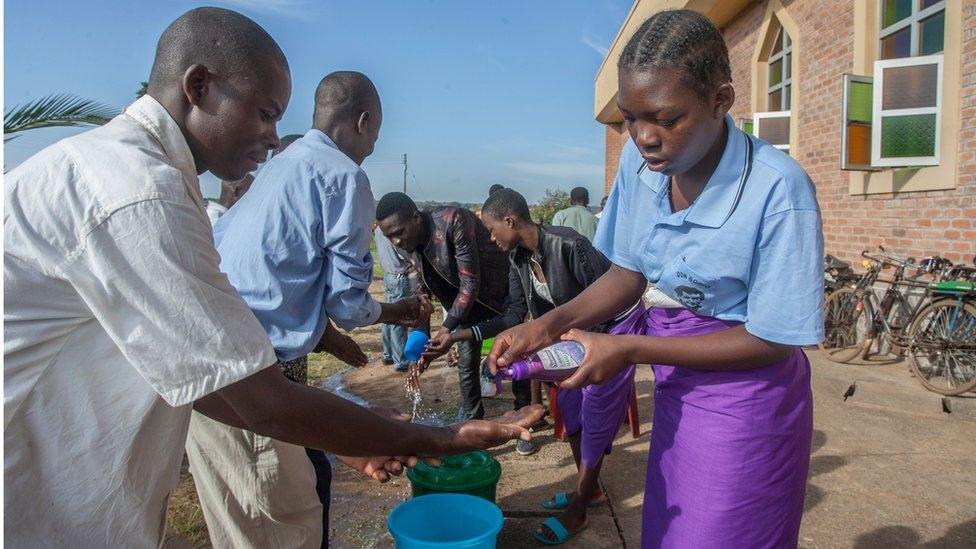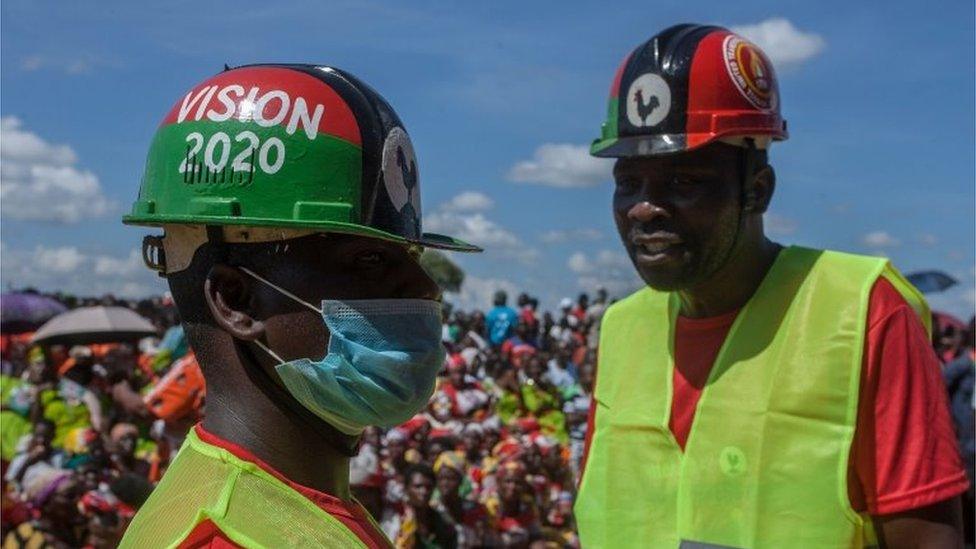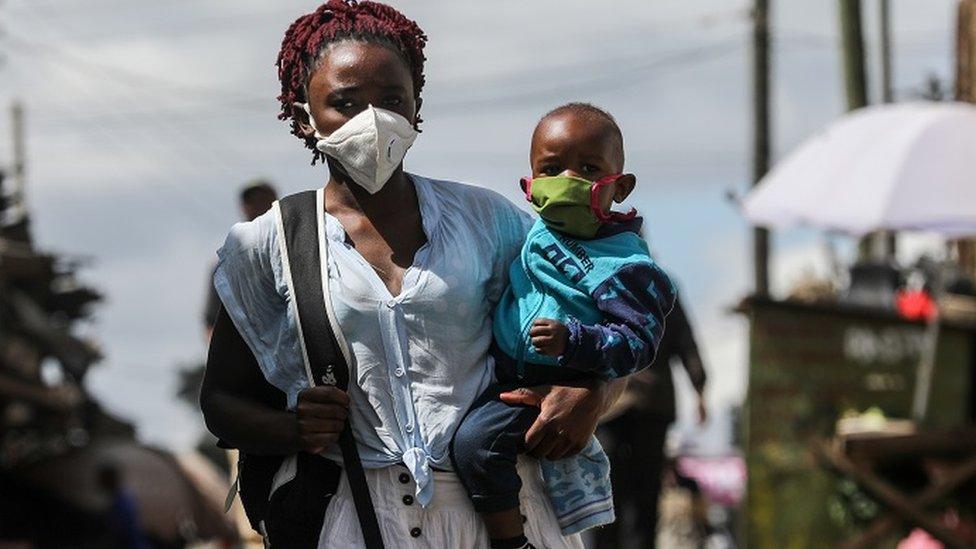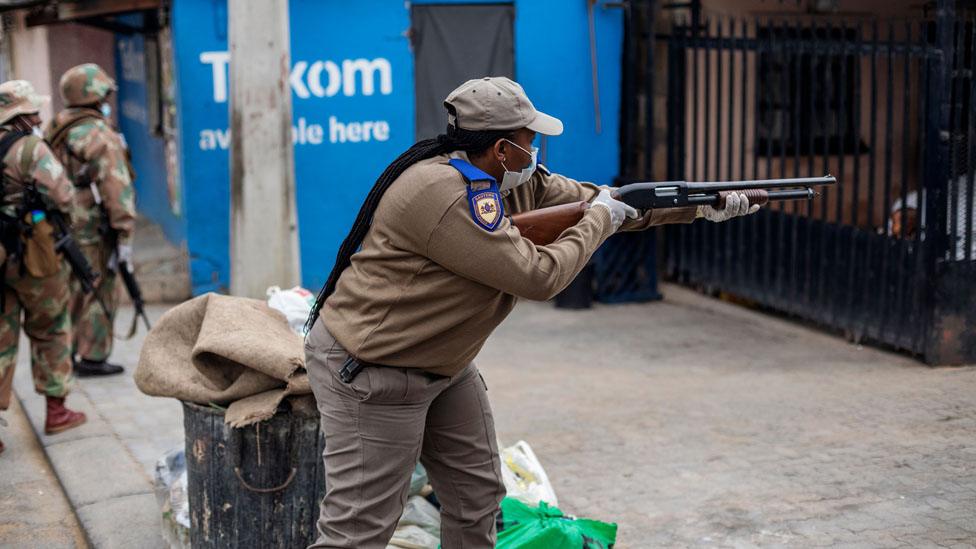Malawi's cash handouts and the row about a coronavirus lockdown
- Published

People in Malawi are free to leave their houses as a court blocked the government's planned lockdown restrictions
Malawi was one of the last countries in the world to announce its first case of Covid-19. But ever since, it has been embroiled in a constitutional row about a lockdown the government wants to impose to tackle the pandemic.
The High Court took the unprecedented step of blocking the government's plans to impose a lockdown until more had been done to help those worst affected.
Now, President Peter Mutharika has announced an emergency cash transfer programme for the poorest people in what is one of the world's poorest countries.
The government will target 172,000 households, who will receive a monthly payment equivalent to almost $50 (£40) through mobile money transfer from Friday.
Why was the lockdown blocked?
On 15 April, the government announced a 21-day lockdown, which was due to start three days later but campaigners complained that the government did this without providing help for those in need.
The Human Rights Defenders Coalition (HRDC) went to court to challenge the government on the issue and the courts blocked the lockdown.
"While we respect the health regulations regarding the lockdown, we want a lockdown that follows all... laws and we do not want rights of vulnerable groups to suffer," said independent rights activist Victor Mhango according to the AFP news agency.
As well as the HRDC, traders in Blantyre and Mzuzu protested after plans to restrict movement were announced.
The traders lit bonfires and police dispersed them.
The vendors said they would not be unable to provide for their families during the lockdown.
Religious groups also sought an injunction of their own, saying the lockdown was a violation of religious freedom.
What did the courts say?
On Friday 17 April, a day before the lockdown was due to start, a court injunction ordered the lockdown be delayed for seven days, pending a judicial review.
Following a judicial review, a High Court judge extended the ban for a further five days.
On Tuesday the judge decided to refer the case to the Constitutional Court because the issues raised by the petitioners required an interpretation of the constitution.
The judge ordered that until the Constitutional Court makes its ruling, the lockdown cannot be enforced.
What are the proposed lockdown restrictions?
With the exception of law enforcement officers and providers of essential goods and services, people would have needed to seek permission to leave the area around their homes.
Providers of essential goods and services would have been issued special permits.
Central markets would have been closed and local markets would only have been allowed to open between 05:00 and 18:00 local time.
Do the cash handouts mean the lockdown could be imposed?

All elections campaigning has been banned but the political atmosphere remains tense
No.
The Constitutional Court still has to hear the case and no date has been set.
For the moment, people are still going about their businesses almost as usual - markets are open and cities and towns remain crowded.
But journalist Peter Jegwa in the capital, Lilongwe, says there is a noticeable change in people's behaviour - with water buckets and soap or sanitisers placed. outside market entrances and shops.
However, campaigning ahead of the election re-run due on 2 July has been banned.
All gatherings of more than 100 people were outlawed under measures taken prior to the lockdown announcement.
Where is the money coming from?
A $37m funding package was approved by the World Bank last week to help Malawi fight the coronavirus.
That would cover payments of about $50 to 172,000 households for roughly four months.
The president has not said how long these cash handouts would continue for.

Deep mistrust between the courts and the government
By Peter Jegwa, Lilongwe
The coronavirus outbreak - and the ensuing court row - comes against a tense political backdrop.
Earlier this year, Malawi's courts took the equally unprecedented step of ordering the annulment of last year's elections, following complaints of rigging from the opposition.
The re-run was due to be held on 2 July.
So when the court once more went against the government, allies of President Mutharika accused it of having a political motivation.
The organisations which brought the case were linked to protests last year which demanded the sacking of the head of the election body and the annulment of the result. There is deep mistrust on both sides.
The opposition has suggested that government is exaggerating the extent of the pandemic and may be even lying about positive coronavirus tests.

How bad is coronavirus in Malawi?
The first cases were announced on 2 April - much later than most countries.
Since then, there have been 36 cases of coronavirus confirmed. Of those, three people are recorded to have died and five people have recovered.
How can I reduce the chance of getting coronavirus?
The best thing is regular and thorough hand washing,, external preferably with soap and water.
The University of Westminster's Dr Adele McCormick demonstrates how to wash your hands
Coronavirus spreads when an infected person coughs or sneezes small droplets - packed with the virus - into the air. These can be breathed in, or cause an infection if you touch a surface they have landed on, then your eyes, nose or mouth.
So, coughing and sneezing into tissues, not touching your face with unwashed hands, and avoiding close contact with infected people are important.
People will be most infectious when they have symptoms, but some may spread the virus even before they are sick.
Face masks do not provide effective protection, according to medical experts. However, the WHO is re-examining whether the public might benefit from using them.

A SIMPLE GUIDE: How do I protect myself?
AFRICA TRACKER: Updates on the continent's cases
HOPE AND LOSS: Your coronavirus stories
FACE MASKS: Should I be wearing one?
VACCINE: How close are we to finding one?

Correction 30 April: This story has been corrected to make it clear that the World Bank funding would cover the handouts for about four months
- Published15 April 2020

- Published9 April 2020
